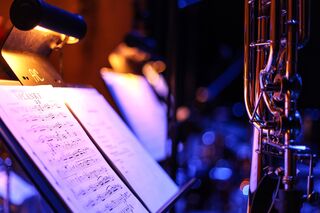Creativity
How Creativity Is Developed Through Expressive Performance
Emphasizing the performer's artistic decision making spurs creativity.
Posted May 12, 2021 Reviewed by Ekua Hagan
Key points
- Preparing and performing a piece of music with the primary goal of being emotionally expressive provides opportunity for creative musicianship.
- Creativity in expressive performance can be nurtured through practicing, but a different kind of practicing than some musicians are used to.
- De-emphasizing technical mastery can encourage creative expressiveness by countering the oppressive voice of perfectionism.
Although some musicians write and arrange pieces, and others play gigs as jazz musicians, it is likely that many more lack the composition and improvisation expertise for such professional activities. This does not mean, however, that they lack creativity altogether in their musicianship. Whenever musicians prepare and perform a piece of music with the primary goal of being emotionally expressive for their audience, they have the opportunity to draw upon and develop their own creative musicianship.

Some musicians who consider themselves performers, but not composers or improvisers, may not fully realize how creativity exists in their musicianship. Composing boils down to making musical decisions and “archiving“ them in such a way as to be remembered later (usually by putting notation on paper or through sound recording). Improvising involves making artistic decisions in the moment, without the aid of specific or “scripted” advanced planning.
The expressive performance of a composer’s musical work is a creative medium for performing musicians who take a composition-like or an improvisation-like approach to performing rehearsed music. With a composition-like approach to expressive performance, musicians use advanced deliberate decision-making, guided by reflection and revision, to select expressive elements that they'll feature across an entire piece. This is what is traditionally called interpretation. Another approach is more improvisatory: Musicians make expressive decisions “in the moment” of performance, deciding exactly how to execute emotionally expressive variations in tempo, dynamics, and articulation. It is likely that the best musicians use both of these approaches in making their performances optimally expressive.
Creativity takes practice
With both of these approaches, the performing musician is a creative artist. Creativity is best understood not as an inborn personality trait, but as a skill set that is developed in a specific domain (i.e., someone who is strong in creative writing will not necessarily have an advantage in musical creativity). Creativity is facilitated by domain experience and can be maximized with deliberate study and practice in the domain. In other words, good creative work is rarely stumbled upon by accident. Musicians who wish to be more creative in their expressive performance can improve their ability to do so by becoming more familiar with the expressive accomplishments of performers who have come before them. This means listening to music, and the more the better (Volioti & Williamon, 2020). It is unreasonable to expect to be genuinely creative in, say, a blues setting if you have not first listened to and learned from a lot of blues music.
The idea of spontaneous creativity (as in improvisation) may seem to run counter to the normal operations of those who spend most of their musical “time on task” planning and practicing for the next concert or recital. In fact, improvisation requires much preparation. Improvisatory music-making is anything but haphazard and unplanned.
Improvisation is a staple in music, just as it is in other performance fields. Improv is a forte of many comedy actors, and in-the-moment decision-making is a key to success in many competitive sports. In all of these fields, improvisation is facilitated by prior experience and a certain kind of practice.
The practice required is broader than what is typically done by musicians who are content with technically accurate performance and precise execution of pre-planned expressive devices. In advance of improvising, musicians do not practice and polish only what will be performed on stage. Rather they practice for a familiarity with the many possibilities that they may choose from in a performance. By the time skilled improvisers perform, they have completed a great deal of preparation, and the spontaneous ideating and performing done in the moment has become second nature to them. Musicians who wish to be spontaneously creative with their emotional communication on stage must practice for this kind of broad familiarity and command of expressive performance devices.
Technical mastery sometimes leads to perfectionism
To be sure, expressive creativity can be nurtured through practice. No matter performers’ age or level of musicianship, they can always challenge themselves to go beyond merely learning the correct “notes and rhythms.” Over-emphasizing technical mastery can bring forth a crude system of simply counting mistakes to determine the quality of a performance. This can encourage the very harmful mentality of perfectionism, which creative artists must avoid at all costs. Creative writing guru Anne Lamott (1995) has called perfectionism “the voice of the oppressor” and a “mean, frozen form of idealism." In contrast, “messes are the artist’s true friend."
Her perspective is reinforced by Yo-Yo Ma who explained, “Perfection is not very communicative. However, when you subordinate your technique to the musical message you get really involved. Then you can take risks. It doesn’t matter if you fail” (Blum, 1998). Such an attitude of creative risk-taking is available to all musicians who prioritize expressive communication in performance. Under these conditions, any musician can be creative through the expressive performance of others’ compositions.
References
Blum, D. (1998). Quintet: Five journeys toward musical fulfillment. Ithaca, NY: Cornell University Press.
Lamott, A. (1995). Bird by bird: Some instructions on writing and life. New York: Anchor Books.
Volioti, G., & Williamon, A. (2020). Performers’ discourses on listening to recordings. Research Studies in Music Education, Advance online publication. DOI: 1321103X19899168.


